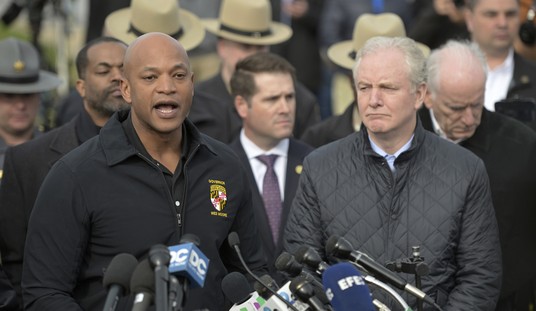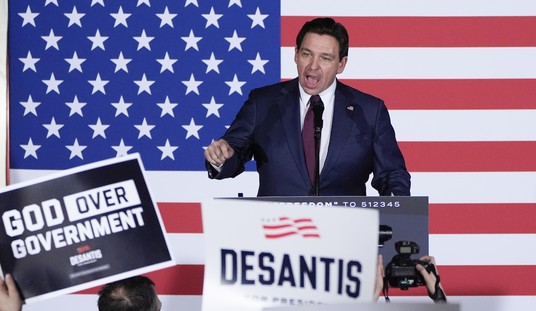Ed’s headline in the Greenroom for this piece (written by the co-author of “The Republicans Are the Problem”) tells you all you need to know about what an unserious bit of trolling it is, but I’m oddly comforted to see it show up on WaPo’s op-ed page. It’s proof positive that even the most celebrated newspapers aren’t immune from having to scrounge for content in the news desert between Christmas and New Year’s. Coming tomorrow, presumably: “Let’s repeal term limits for Obama.”
Still, it’s worth writing about for two reasons. One: Conservative dissatisfaction with Boehner is real. We may well end up with a new Speaker on January 3. No harm in thinking about alternatives. Two: It’s a useful prism through which to consider the leadership void in the GOP right now.
What if Boehner doesn’t survive? Go to Article I, Section 2: The Constitution does not say that the speaker of the House has to be a member of the House. In fact, the House can choose anybody a majority wants to fill the post. Every speaker has been a representative from the majority party. But these days, the old pattern clearly is not working…
The best way out of this mess would be to find someone from outside the House to transcend the differences and alter the dysfunctional dynamic we are all enduring. Ideally, that individual would transcend politics and party — but after David Petraeus’s stumble, we don’t have many such candidates. It would have to be a partisan Republican.
One option would be Jon Huntsman. By any reasonable standard, he is a conservative Republican: As governor of Utah, he supported smaller government, lower taxes and balanced budgets, and he opted consistently for market-based solutions. As a presidential candidate, he supported positions that were in the wheelhouse of Ronald Reagan. But a Speaker Huntsman would look beyond party and provide a different kind of leadership. He would drive a hard bargain with the president but would aim for a broad majority from the center out, not from the right fringe in. He could not force legislation onto the floor, but he would have immense moral suasion.
Another option would be Mitch Daniels, the longtime governor of Indiana and a favorite on the right. Daniels has shown a remarkable ability to work with Democrats and Republicans, and he is a genuine fiscal conservative — meaning he does not worship at the shrine of tax cuts if they deepen deficits, and he would look for the kind of balanced approach to the fiscal problem put forward by Simpson-Bowles, Rivlin-Domenici and the Gang of Six.
It’s true, Huntsman or Daniels might pursue some sort of Bowles-Simpson deal with Obama. So what? Even if one of them hammered out a mutually acceptable deal with Obama, how would he get it passed? The difficulty in the House isn’t that Boehner’s opposed to a grand bargain or a “balanced approach,” it’s the fact that (a) the Democratic caucus is overwhelmingly liberal and (b) the tea party minority on the GOP side is sizable enough that it can block nearly any bill that relies on Republican votes alone to get to 218. And thanks to the magic of gerrymandering, congressmen from deep red or deep blue districts — of which there are many — have more to fear from a primary challenge by someone to their right or left, respectively, than they do from the general election. (Some Republicans were candid about this in explaining why they voted against Plan B.) Jon Huntsman’s alleged “immense moral suasion” isn’t going to convince a liberal or conservative whose ass is on the line in two years to back a compromise bill that neither side likes.
Is there anyone with enough “moral suasion” to convince a divided caucus to pass a compromise with the president, though? If Democrats had this problem, the obvious answer (as it always is) would be Bill Clinton. He remains hugely popular in his party and among the population generally, and he has the gravitas of being an ex-president. There’s no one like that on the Republican side, someone so respected by all wings of the party that their endorsement of a “grand bargain” package would provide enough political cover to conservatives to vote for it that they wouldn’t have to worry (much) about a primary. Daniels does have lots of cred nationally on fiscal issues but not remotely enough stature for a recalcitrant conservative congressman to cast a tough vote without fear of consequences. The only person I can think of who might fit the bill is Paul Ryan: He’s showed unusual seriousness on the federal budget with the Path to Prosperity, he has a national profile now thanks to Romney, and he knows members of the GOP caucus personally, which is key to persuasion. The problem is, as someone with presidential ambitions, Ryan would be nuts to step into this role. He’ll face the same primary problem on a national scale in 2016 as individual Republican congressmen will face two years from now. And he’s refused to compromise on a grand bargain when he’s had opportunities in the past. Remember, he voted no on Bowles-Simpson because it didn’t go far enough to reduce health-care costs. Why would he want the most thankless job in Washington, then? Best-case scenario is that he helps pass a grand bargain that conservatives dislike. Worst-case scenario is that the gridlock continues and he’s derided by the media as an ineffective leader. (He endorsed Boehner’s Plan B and yet they couldn’t even get the bill to the floor.) Who needs that?
You know, now that I think of it, there is a guy out there with the stature and moral suasion to deliver 100+ votes from his own party for a significant compromise on deficit reduction if he was really, really interested in one. Is he?








Join the conversation as a VIP Member